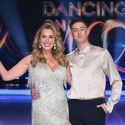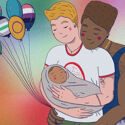
One particular scene has played out in my mind dozens of times.
I am at a casual dinner with my family. My older brother wears a baseball cap after a long day at work, and my two moms – a retired police officer who habitually takes the side of the booth facing the front door, and a retired teacher who leans her head on my other mom’s shoulder as the waiter takes our plates away. At the end of the night, one of us makes a comment about how good the food was, and why did we ever stop coming here?
I love my family. It’s a good night.
The waiter comes back and stops us mid-conversation with a simple question – “will this be on one check, or two?” looking between the two ladies with similar haircuts and Eddie Bauer jackets (are they sisters?) and the two young men who…could be their respective sons?
How about we take this to the next level?
Our newsletter is like a refreshing cocktail (or mocktail) of LGBTQ+ entertainment and pop culture, served up with a side of eye-candy.
“Together,” someone eventually surrenders, and we all look down at the table for a long moment before deciding collectively not to talk about the question we were just asked. After all, maybe every family does get that question. He just wanted to be sure. Still, as we leave the restaurant, I can never shake the feeling that something has been taken from us.
Families with same-sex parents are no strangers to questions like this. In fact, most would put this kind of microaggression at the bottom of a list that would include long stares, insensitive comments, and questions such as “who is the father figure in your house?” Yet the research continuously shows that children of same-sex parents fare just as well as children raised by opposite-sex parents in areas of development across the board, including academic performance, cognitive development, social development, and psychological health.

My parents, Cindy and Bridget, gave birth to both my brother and me through artificial insemination. I likely will never see or meet my sperm donor, and my curiosity about him does not stretch far beyond what he looked like at my age. Growing up with two moms, I spent my childhood taking every opportunity I could to celebrate the uniqueness of my family in our rural Illinois town. Every harsh “your mom” joke thrown my way was met with a sharp “which one?” and always followed by an eruption of laughter in my middle school cafeterias.
If you would have asked me, our family was not “different” at all, unless by “different” you meant “unique,” and by “unique” you meant “cool.” In that case, yes, we were very different, hyphenated names and all.
I’ll never forget watching then-19-year-old Zach Wahls – now an Iowa Senator – speak to the Iowa House of Representatives about his two moms during the fight for marriage equality in 2011.
“The sexual orientation of my parents has had zero effect on the content of my character,” he testified. I was in middle school when this happened, and just beginning to realize that I myself might be gay. These words opened up a world of radical self-acceptance for me, and two years later at 15 years old, I would skip a day of school to march with my moms at our own state capitol for marriage equality, sandwiched between two other members of our open and affirming church in the back seat of a car.

On Mother’s Day, I celebrate memories like this that made me who I am, but I also look back on the less positive formative moments, times when I watched my parents, trailblazers to have two children together in the mid-1990s, work twice as hard to earn a fraction of the respect every other parent took for granted. I watched them leave a family member’s funeral, unwelcome. I watched school employees force explanations out of them, inquiring about blood relations and our living situation. I watched my mom march down our neighborhood street and knock on the door of my second-grade bully’s house to have a word with his parents; Jake never threw rocks at me riding my bike again.
I will never forget the night that I came out to both of my parents, my chest exploding under my sweatshirt and a lump in my throat. Of course they reacted well, but my biggest fear was how this might be another hurdle for them to jump through. Would they suddenly be the lesbians who turned their son gay? The endless research and data (not to mention, one glance at my straight brother with his fishing and hunting gear) would dispel this idea. Nevertheless, the fear remained, and still lingers. Years after leaving home to go to college and start my life, I look back and laugh at anyone who might have suggested that having two moms led me to be a gay man myself.
“If anything,” I tell them now, “they showed me every day how women should be treated in a marriage.”
I returned home to be with my family eight weeks ago at the start of the COVID-19 pandemic, and that part hasn’t changed one bit.
On this Mother’s Day, let us salute the many same-sex parents who must go the extra mile to make sure their kids feel loved just the way they are, and accepted just the way their family is. Here’s to the moms who have to work overtime for their children to live happy lives, and then beyond that to make sure their children don’t have to see them working overtime.
Here’s to a future that we get to witness and create because of people like moms.
Tiernan Bertrand-Essington is a writer, filmmaker and literary critic. He lives in Los Angeles. Check out his author interviews on TheBookTuber.




















PLAYS WELL WITH OTHERS
Tiernan, the only thing that defines a family is the love and support each member has for each other. It’s clear you have an amazing loving set of Parents. That is all that matters…
And to those who use the Bible as an excuse to cast hatred and bigotry against Gay families I counter with this:
1 Timothy 5:8
“But if any provide not for his own, and specially for those of his own house, he hath denied the faith, and is worse than an infidel.”
Happy Mother’s Day to your two amazing Moms
lawchanger
Tiernan you are an amazing man and your mothers have every right to boast about and be proud of your achievements. You and your brother are such fantastic guys to know. Every child should be as lucky as you and your brother to have such loving, caring parents. We love all of you!!!
jayceecook
I can’t speak to the specific server you had but I can tell you that most restaurants will advise their servers to ask that question when a table or booth has more than one patron. Unless it’s extremely, extremely obvious that everybody is family or a couple on a date, which is not as easy as you’d think, they will ask this question. It’s not a “microaggression”. It’s policy.
Your server very well could have thought you and your brother were a couple along with your two Moms depending on how old you were at the time. Or yes, maybe he did think that you were simply two Mom friends out with their sons. It’s kind of unfair to expect everybody around you to know the ins and outs of your private life. Most of the time servers are too busy with other crap to even be thinking about you except your order and how much of tip they think you might leave. Or how long you’ve been occupying the table or booth because the longer you are there the less money they will possibly make because they rely on getting customers in and out then replaced with new ones.
It’s fantastic that you and your brother have two wonderful, loving parents who seemingly raised you to be good people. The stronger your family is and the longer you all succeed just makes those people over the years who made your life difficult less and less significant.
Just remember that the insight you expect other people to have about you and your family works both ways.
charm
Thank you for such a wonderful and enlightening article.
I appreciate your history, insight, and journey and your perspective re. your moms. I think I might know one of your moms, and not to intrude, would like to private message. I think I babysat her! And then once when I was working ER and was alone with a pt who got into trouble, I called for help, and no one came. (The other nurse I was working with, and the ER doc were in the back smoking and heard me but chose to ignore me – they were both good guys, but what they said was they didn’t think I needed them and thought I was ok.) If your mom is who I think she is, she happened to come in just then on some police business, just the right time, right place, and helped me get things straightened out.
Ok all of that is beside the point. This is a beautifully written and heart felt inspiring article that helps people see through the eyes of another.
Many thanks and blessings to you.